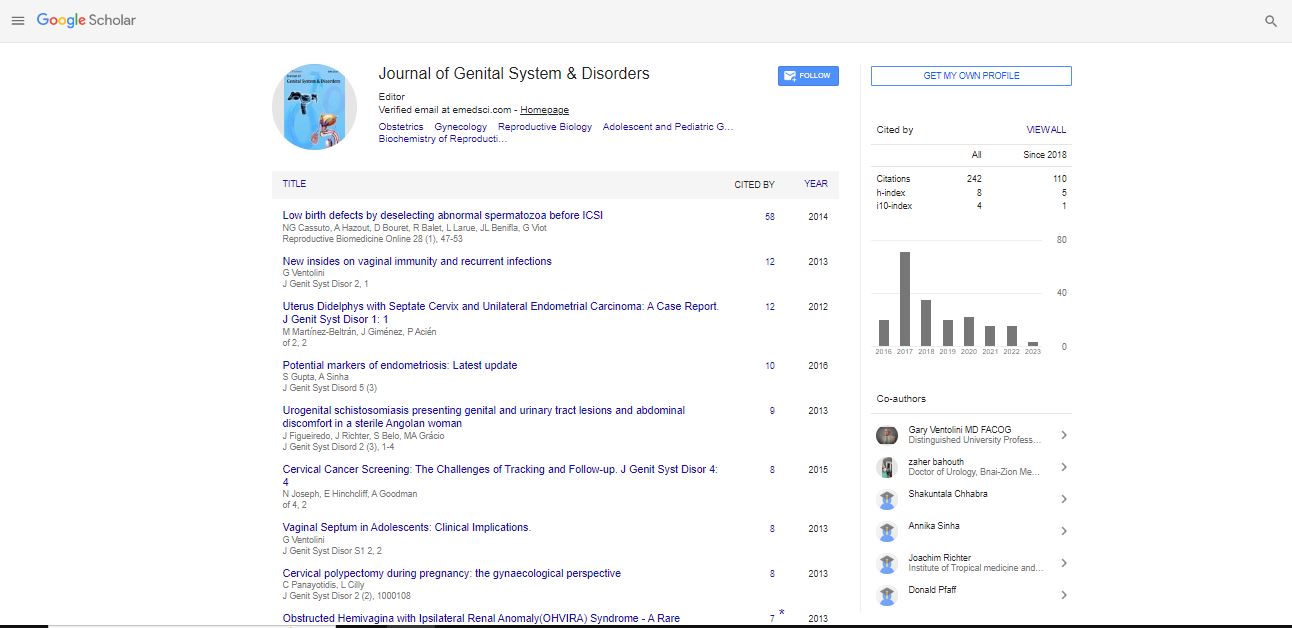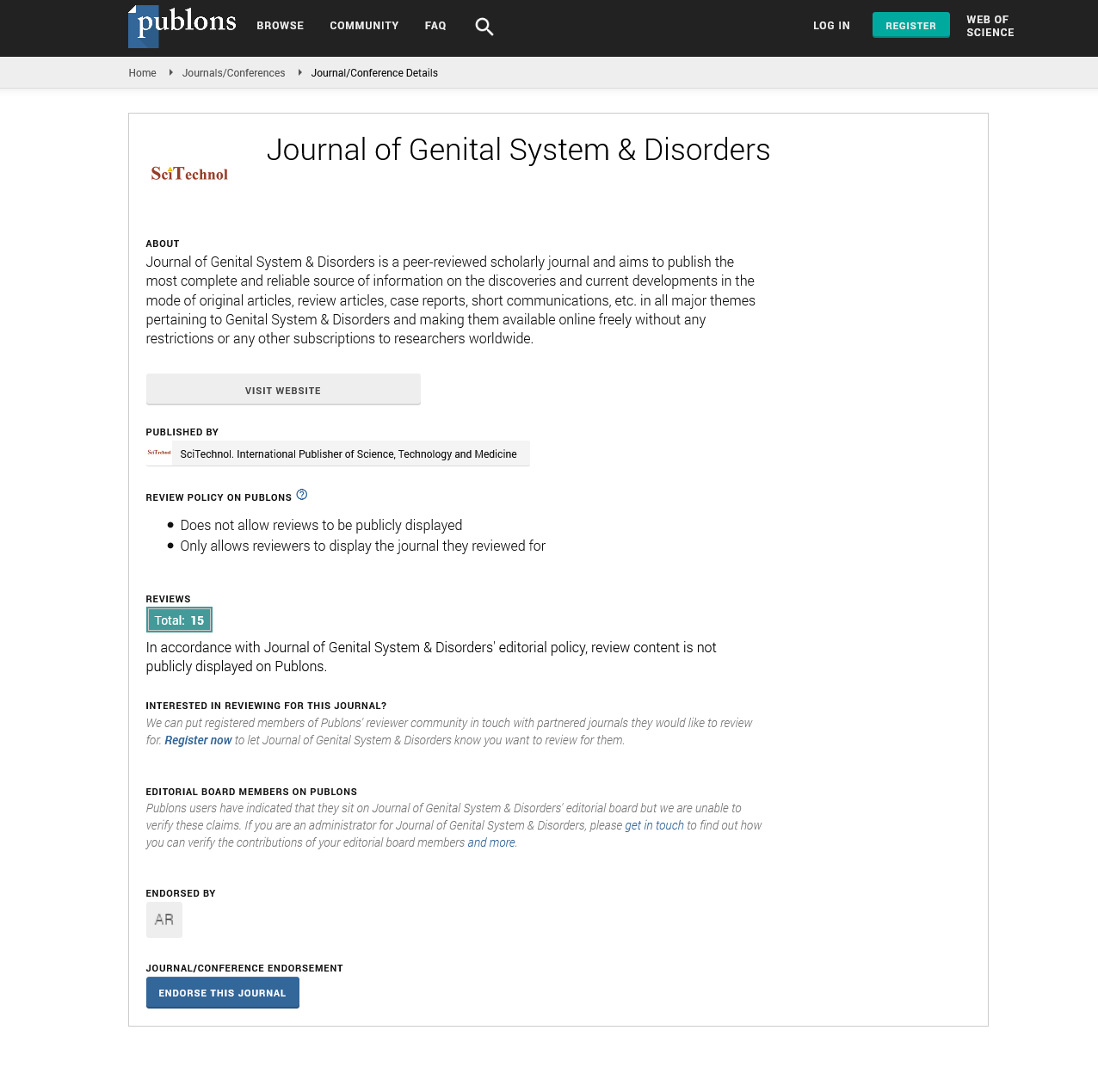Perspective, J Genit Syst Disord Vol: 11 Issue: 5
Dietary Selenium Intake and Thyroid Cancer Risk in Postmenopausal Women
Basle Fatei*
Department of Human Pathology and Development, University of Messina, Messina, Italy
*Corresponding Author: Basle Fatei
Department of Human Pathology and Development, University of Messina, Messina, Italy
Email: baslef93@yahoo.com
Received date: 17 August, 2022, Manuscript No. JGSD-22-60064;
Editor assigned date: 19 August, 2022, Pre QC No. JGSD-22-60064 (PQ);
Reviewed date: 30 August, 2022, QC No. JGSD-22-60064;
Revised date: 10 September, 2022, Manuscript No. JGSD-22-60064 (R);
Published date: 18 September, 2022, DOI: 10.4172/ 2325-9728.1000264
Citation: Fatei B(2022) Dietary Selenium Intake and Thyroid Cancer Risk in Postmenopausal Women. J Genit Syst Disord 11:5.
Keywords: Reproductive Biology, Reproductive Endocrinology, Reproductive Immunology
Introduction
Approximately 70% of midlife western women experience Hot Hormone Therapy (HT), using oestrogen either alone or in combination with progestogens, is often recommended for the management of menopausal symptoms. The other supplement used in this study is Pfaffia paniculata, a common root in South America, especially in Brazil, popularly known as Brazilian ginseng, with reported estrogen-like effects. Flashes (HF) in menopausal transition. Hot flashes in midlife women may last few months, or some years and, in certain cases, even up to 30 years. Following recent medical advances and the consequent increase in life expectancy, the number of menopausal women is on a rapid rise in western countries, thus postmenopausal years constitute about one-third of women’s lives. Menopause is a biological event associated with a cessation of women reproductive ability as a consequence of the exhaustion of the ovarian reserve. Age at menopause in the world ranges between 40-58, with an average of 51 years. It also involves menopause-related complaints and disorders. Hormone changes observed in this period may cause a variety of symptoms: Irregular menstrual cycle, vasomotor and psycho-emotional disorders, urogenital dysfunctions, cardiovascular diseases, lipid disorders, osteoporosis, type 2 diabetes mellitus, and mental disorders. However, many women prefer complementary or alternative remedies such as herbal preparations or nutraceuticals, which are often perceived as natural and therefore free of adverse effects. One of the alternatives to HT is Lepidium Meyenii (Maca), which is an Andean plant of the brassica (mustard) family, widely spread in several South American countries. For centuries, Maca has been used successfully by native people of Peru for hormonal imbalances, menstrual irregularities and infertility. Some reports suggest that Maca can be helpful in reducing discomfort caused by menopausal symptoms, including hot flashes, vaginal dryness, and loss of energy, reduced libido and depression. The aim of the study was to ascertain whether this new supplement might improve the quality of life of postmenopausal women.
The inclusion criteria were the presence of postmenopausal symptoms, first of all hot flashes, an age from 45 to 60, no hormonal therapy or other alternative treatment and no psychiatric treatment by the time. The study involved 60 Italian women who had their last menstrual period at least one year before the study. The outpatient women who met the above criteria were informed about the possibility of taking part in the study.
This Index assesses the severity of 11 menopausal symptoms, such as Hot flashes, sweats, insomnia, nervousness, melancholia, dizness, fatigue, arthritic pain, headache, palpitations and formication. The quality-of-life was evaluated trough the Kupperman Index (KI), a well-validated, nonintrusive, self-report questionnaire that measures the physical and psychological symptoms associated with menopause. All 60 participants included in the study were instructed to record in a diary the number and the severity of hot flushes. The baseline and 3- month hot flash counts were calculated as the mean of the last 7 days before treatment and before each monthly control and after an informed consent, they were randomly assigned to receive the supplement (200 mg of Maca and 150 mg of Pfaffia Panniculata, n=30) or placebo (n=30) for 3 months. A computerized database was used for randomization. Placebo and supplement tablets had a similar appearance.Reductions from the baseline in the frequency and severity of hot flashes were the principal criteria of efficacy. The severity of hot flashes was evaluated using a score from 1 to 3:1, mild; 2, moderate; 3, severe. Mild hot flushes were defined asa warm sensation without sweating that left the woman able to continue her daily activity. Severe hot flushes were defined as a hot sensation with sweating so intense that the woman had to stop her activity. Moderate hot flushes were defined as a warm sensation with sweating that left the woman able to continue her daily activity. Each symptom on the KI was rated from 0 to 3 for no, slight, moderate, and severe complaints. The symptoms were weighted as follows: Hot flushes, sweats, insomnia, nervousness, and all other symptoms. The highest potential score is 51. The scores obtained wereinterpreted as points no menopausal symptoms, points-mild symptoms, points-moderate symptoms, and more than 30 points- severe symptoms. The primary outcome of the study was the changes in frequency and severity of menopausal symptoms in the group treated with this new supplement. Written informed consent was obtained from all participants; the protocol and other materials were in accord with the Helsinki Declaration of 1975 and approved by institutional review boards.
Statistical Tests
A two-way analysis of variance with repeated measures followed by a post hoc multiple-comparison procedure was performed to verify differences in the numbers of hot flashes and other symptoms between different treatment groups and within groups over time. The demographic characteristics of the study groups and the number of hot flashes and severity score are expressed as mean ± SD. The Student’s t test was initially used to verify the differences betweenthe independent groups. Statistical tests were two tailed; the significance level was set at P<0.05, and data were analyzed with SPSS software, version 17.0.
Postmenopausal Women
Thus, women treated with this supplement changed from the area of severe symptoms to the area of no symptoms. The KI value indicated that Lepidium Meyenii plus Pfaffia Pnniculata treatment was associated with a significant reduction in symptom scores of about 50% from baseline values. The improvement of wellbeing in these women was determined not only by a significant reduction in hot flashes number and severity, but also by symptoms such as nervousness and melancholia, which suggests some effects on mood.
A systematic review that included four RCTs tested the effects of Maca on menopausal symptoms in healthy perimenopausal, early postmenopausal, and late postmenopausal women. The review showedfavorable effects of Maca on menopausal symptoms using the KI and the Green Climacteric Score; despite some limitations of methodological quality. A border line difference was evidenced for fatigue, confirming a very recent study, in which 2 fractions of polysaccharide extracted from Lepidium Meyenii presented dose-dependently positive effects on the fatigue related parameters. Furthermore, experimental studies showed that Maca may improve memory impairment. However, it’s probably that such effects may depend on plant sterols, which act as chemical trigger to produce higher level of hormones appropriate to the age and gender.
These saponins are considered the main active components of the root and they have several biological properties. Experimentalstudies have demonstrated that oral intake of P faffia Paniculata significantly increased levels of female and male sex hormones (estradiol-17β, progesterone and testosterone) in mice. Furthermore, Gonzales et al. reported that the glucosinolates of maca could function as antioxidants and free radical scavengers. Safety has not yet been proven, although Maca has been reported tohave low toxicity in both in vivo and in vitro studies. The other plant extract contained in the supplement was Pfaffia Paniculata, that probably exerts similar effect of Maca because its main components are stigmasterol, sitosterol, allantoin, pfaffic acid, and glycosides, which are triterpenoid saponins, denominated pfaffosides A, B, C, D, E and F.
 Spanish
Spanish  Chinese
Chinese  Russian
Russian  German
German  French
French  Japanese
Japanese  Portuguese
Portuguese  Hindi
Hindi 
